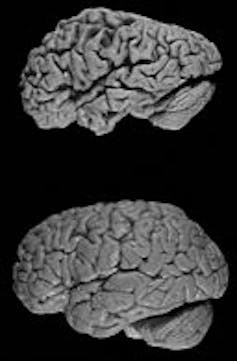 Researchers are now looking at the effects of diet in developing Alzheimer’s disease. J. McPherskesen/Flickr
Researchers are now looking at the effects of diet in developing Alzheimer’s disease. J. McPherskesen/Flickr
Is there a link between diet, obesity and Alzheimer’s?
Published: November 2, 2022
Alzheimer’s disease is more common among older people but it’s not a normal part of ageing. And as the global population ages, the rate of Alzheimer’s is expected to rise – from 36 million to 115 million sufferers by 2050.
The definitive cause of Alzheimer’s disease is still unknown. What we do know is that the brain of an Alzheimer’s sufferer develops abnormal protein build-up that interferes with neurological signals. This causes brain cell death, resulting in progressive and irreversible damage.
Recent research and media reports point to diabetes and obesity as contributing factors to the rising prevalence of Alzheimer’s disease. How strong is this link?
Type 2 diabetes
Research shows that the risk of Alzheimer’s increases by 1.6-fold higher in people with type 2 diabetes. In fact, Alzheimer’s shares the same risk factors as type 2 diabetes and heart disease, such as obesity and insulin resistance. And like type 2 diabetes and heart disease, Alzheimer’s is now considered a chronic lifestyle disease rather than a disease of the elderly.
Large population studies have shown that improvements in controlling diabetes and cardiovascular health, combined with physical activity and a better diet, reduce the risk of Alzheimer’s.
But that doesn’t mean that obesity and diabetes cause Alzheimer’s disease. Although the presence of diabetes significantly increases the risk of developing Alzheimer’s, these diseases occur independently.
Clinical evidence
A 2005 study showed that the brains of people with Alzheimer’s had reduced levels of insulin. And studies of mice fed a high-fat, high-sugar diet displayed features of both Alzheimer’s and insulin resistance. Numerous studies since have also shown Alzheimer’s and insulin resistance co-existing.

The suspected link between Alzheimer’s and insulin resistance points to insulin’s role in normal brain function. Insulin regulates glucose (the key brain fuel) metabolism as well as many other chemical processes important in memory and cognitive function. In type 2 diabetes, insulin resistance in muscle and liver is thought to lead to toxic fats called ceramides. Ceramides are produced in the liver of people with type 2 diabetes, and travel to the brain causing brain insulin-resistance, inflammation and cell death.
These findings led researchers to investigate the effects of insulin therapy. Four months of intranasal insulin therapy in 104 adults with cognitive impairment and Alzheimer’s showed improved memory and functional ability.
The diet-obesity-Alzheimer’s link
Epidemiological studies may find a link between an unhealthy diet and Alzheimer’s through this insulin-resistance theory. So, can a poor diet contribute to cognitive decline and dementia?
A diet high in saturated fats has been linked to insulin resistance. And a high glycemic index diet leads to high blood glucose in people with glucose intolerance. Excess consumption of energy leads to weight gain and abdominal obesity leads to increased levels of chronic inflammation, which can affect brain tissue.
Despite the difficulties epidemiological studies have in establishing causal relationships, it’s important to note other factors in a poor diet. A poor diet can lead to anaemia, which can affect cognition and memory. Elevated homocysteine levels from low folate intake also causes inflammation. And low intake of B-group vitamins can lead to poor neurological function.
There are currently over 1000 registered clinical trials investigating the effect of different drugs or single nutritional supplements on the development of Alzheimer’s disease. But to date, there’s not enough evidence to show significant improvement in Alzheimer’s by using specific drug or individual components of a diet.
Most of the nutrition trials have focused on single nutrients or “magic bullets”, and not on whole diets.
Evidence of benefit of whole diets
A recent systematic review of 11 prospective studies worldwide examined the link between a Mediterranean-type diet and cognitive decline (including Alzheimer’s). It showed almost a 50% reduced risk of developing Alzheimer’s. Research participants who already had Alzheimer’s had a 73% lower risk of dying of the disease.

And a recent meta-analysis including 1.5 million people and 35 studies worldwide showed that closer adherence to a Mediterranean diet had a 13% less risk of death from neurodegenerative diseases such as Parkinson’s disease and Alzheimer’s.
A Mediterranean diet may be protective against Alzheimer’s because of its antioxidant and anti-inflammatory components, such as long chain omega- 3 fatty acids; carotenoids and flavonoids found in vegetables and fresh fruit, and polyphenols found in wine, legumes and nuts.
The future
The rapid rise of Alzheimer’s disease has been referred to as a “mental health tsunami” and there’s a big rush to find treatments. There are currently a number of promising medical treatments, including the intranasal insulin spray which has reduced cognitive decline and improved memory in a small trial of Alzheimer’s sufferers.
Another treatment involves a vaccine that stimulates the immune system to attack the toxic amyloid proteins in the brain. Other treatments involve strengthening the immune system, and genetic manipulation that boosts nerve growth factors, regenerating damaged brain tissue. Experts report that all of these medical treatments are more likely to be effective in the early stages of Alzheimer’s. The challenge in fighting this debilitating disease is early detection, or better still, prevention.
Although many nutritional supplementation trials have had inconsistent results, there’s strong evidence that diet and lifestyle play a major role in prevention or delay. There’s some hope from current trials in the benefits of omega-3 fats, flavonoids such as quercetin found in onions and many other plant foods, and some culinary spices such as curcumin (from tumeric) which have strong anti-inflammatory properties. But a magic bullet approach is unlikely to be the answer.
If the obesity-Alzheimer’s link is proven, the logical way to reduce the risk and delaying the onset is through a whole diet approach.![]()
Catherine Itsiopoulos, Associate Professor, Head of Department of Dietetics, La Trobe University
This article is republished from The Conversation under a Creative Commons license. Read the original article.
Related Opportunities & Deals
Authors
Catherine Itsiopoulos
Associate Professor, Head of Department of Dietetics, La Trobe University
Disclosure Statement
Catherine Itsiopoulos receives funding from the National Health and Medical Research Council.




